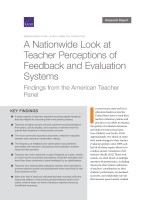| 来源类型 | Research Reports
|
| 规范类型 | 报告
|
| DOI | https://doi.org/10.7249/RR2558
|
| 来源ID | RR-2558-BMGF
|
| A Nationwide Look at Teacher Perceptions of Feedback and Evaluation Systems: Findings from the American Teacher Panel |
| Andrea Prado Tuma; Laura S. Hamilton; Tiffany Tsai
|
| 发表日期 | 2018
|
| 出版年 | 2018
|
| 页码 | 24
|
| 语种 | 英语
|
| 结论 |
- A large majority of teachers reported receiving regular feedback that was helpful for improving their instructional practice.
- Teachers at higher-poverty schools reported receiving feedback from peers, school leaders, and coaches or mentors more frequently than teachers in lower-poverty schools.
- The most commonly reported component of teacher evaluation systems was classroom observation ratings.
- The frequency of feedback and observations was positively associated with teachers' perceptions that evaluation systems improved their practice.
- Teachers who were observed or given feedback by a peer, mentor, or coach had more-positive perceptions of teacher evaluation systems than those observed or given feedback by an administrator.
- Teachers who believed that evaluation systems were intended to promote teacher growth and development were more likely to rate those systems as fair.
- More than half of teachers indicated that they received sufficient resources related to formal instructional feedback and/or evaluation, while at least one-third of teachers reported receiving insufficient resources.
|
| 摘要 |
- School and district leaders who design feedback systems should consider how much emphasis to place on the formal feedback that occurs as part of an evaluation system versus the less-formal feedback that teachers often receive from colleagues, administrators, and others, and whether increased emphasis on the former might come at the expense of the latter.
- Practitioners and policymakers looking to improve teachers' perceptions of evaluation systems should consider providing teachers with multiple opportunities for classroom observation and feedback provision.
- Researchers could explore the design of teacher evaluation systems that reduce the time burden on school administrators by involving teachers' peers, coaches, and mentors as both classroom observers and feedback providers.
- Efforts to communicate clearly about the potential benefits of evaluation systems should be coordinated so that teachers receive consistent messages from central office staff, school leaders, and professional teacher organizations.
- Practitioners and policymakers involved in the implementation of teacher evaluation systems should consider not only how to provide school leaders with sufficient resources, such as training and time to effectively carry out evaluations, but also how to provide teachers with the resources they need to participate in evaluations in a way that improves their ability to benefit from such systems.
|
| 主题 | Education Policy
; Educational Program Evaluation
; Teacher Effectiveness
; Teacher Training
|
| URL | https://www.rand.org/pubs/research_reports/RR2558.html
|
| 来源智库 | RAND Corporation (United States)
|
| 引用统计 |
|
| 资源类型 | 智库出版物
|
| 条目标识符 | http://119.78.100.153/handle/2XGU8XDN/108850
|
推荐引用方式
GB/T 7714 |
Andrea Prado Tuma,Laura S. Hamilton,Tiffany Tsai. A Nationwide Look at Teacher Perceptions of Feedback and Evaluation Systems: Findings from the American Teacher Panel. 2018.
|
|
文件名:
|
x1538057282932.jpg
|
|
格式:
|
JPEG
|

|
文件名:
|
RAND_RR2558.pdf
|
|
格式:
|
Adobe PDF
|
除非特别说明,本系统中所有内容都受版权保护,并保留所有权利。